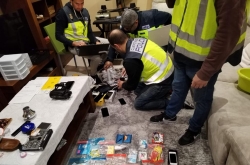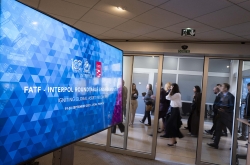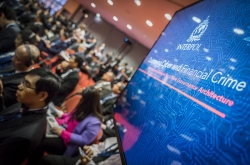FRANKFURT, Germany – Developing a national coordinated approach in Austria, Germany and Switzerland against threats to the integrity of sport was the focus of a workshop organized by INTERPOL and the International Olympic Committee (IOC).
A main objective of the workshop was to identify key stakeholders to help establish national platforms in the three participating countries to facilitate the national, regional and international cooperation required to preventing and investigating competition manipulation and other threats to the integrity of sport.
The two-day event (6 and 7 November) was hosted in close cooperation with the German Federal Criminal Police Office (BKA) and the German Olympic Sports Confederation (DOSB). It was supported by the Council of Europe and Sportradar.
The workshop brought together more than 70 representatives from German law enforcement, government, betting entities and sports organizations, as well as high-level delegations from Austria and Switzerland.
Opening the workshop, Stefan Michel, Head of Economic Crime at the BKA said: "To effectively address corruption in sport and match-fixing, it is in the interest of law enforcement authorities to strengthen cooperation with other actors in this field, especially sports federations. Today's workshop makes a valuable contribution in this regard."
INTERPOL and the IOC are currently implementing a Global Capacity-Building and Training Programme to assist countries to address the new criminal challenges posed by competition manipulation and other threats to the integrity of sport.
Thomas Arnold, Chief Financial Officer at the DOSB said: “Protecting the integrity of sport is key to the future of sport. We are aware of the risks of manipulation of competitions and strongly support the efforts of INTERPOL and the IOC to assist National Olympic Committees and other stakeholders in setting up prevention and training programmes.”
Integrity in Sport workshops are organized in countries worldwide to foster collaboration between law enforcement, National Olympic Committees and national sports federations, public authorities and government ministries, the betting industry and other actors involved in preventing crimes threatening sport.
“Cooperation between law enforcement as well as sports organizations and other key actors is critical to building an intelligence picture. This allows national authorities to anticipate threats and put preventive measures in place as part of a comprehensive and unified approach against match-fixing,” said Sebastian Bley, Coordinator of INTERPOL’s Anti-Corruption unit.
Identifying and sharing best practices against competition manipulation and corruption in sport and more effectively protecting the future of sport nationally and internationally also topped the agenda at the workshop.
The event allowed INTERPOL to strengthen its links with key members of its Match-Fixing Task Force and create ties with potential new investigators for the sharing of information, intelligence and best practices.
INTERPOL and the IOC recently expanded their joint global capacity-building and training programme until 2021 to protect the integrity of sports.
Countries involved
Related news

Spain dismantles global match-fixing ring with INTERPOL support
15 September 2023










